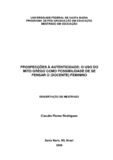| dc.creator | Rodrigues, Claudia Flores | |
| dc.date.accessioned | 2017-02-06 | |
| dc.date.available | 2017-02-06 | |
| dc.date.issued | 2008-05-02 | |
| dc.identifier.citation | RODRIGUES, Claudia Flores. PROSPECÇÕES À AUTENTICIDADE: O USO DO MITO GREGO
COMO POSSIBILIDADE DE SE PENSAR O (DOCENTE )FEMININO. 2008. 121 f. Dissertação (Mestrado em Educação) - Universidade Federal de Santa Maria, Santa Maria, 2008. | por |
| dc.identifier.uri | http://repositorio.ufsm.br/handle/1/6849 | |
| dc.description.abstract | In this work intends to grow a reflection it remains in that measured the use of the myth as metaphor to think on her the feminine, it can limit or powerful the educational
work. The thematic accuses X woman in the universal history he/she has as conductive thread the myth of Pandora, in what refers to the blame attributed to the
woman and the blames that the women carry as reflex of a Jewish-Christian education in times of modernity or the triple day of work reflex of the life of this
century. As theoretical reflectors " of analysis, he/she appears the gender, tends socially in view the attempt of understanding of the relationship built between men
and women, as well as of the construction of the woman teacher's feminine subjectivity. Divided in four moments, the work begins with a narrative fictitious maid
starting from real facts. Further on, teacher Ethos's character that will dialogue with the protagonist of the history about the human's propositions appears, what is worth the own narrator's internal dialogues and explicit the authors that go being introduced in your ideas along the narrative. The third part is the interviews (real) with teachers that talk about some of your existences. Finally, after the analysis of the interviews,
the absolution of Pandora and the presentation of the categories observed in the interviews it works as backdrop for a reflection on the subject's formation and the use
of the Greek myth as possibility of to think on him and to bring to the surface searches on the human, in the case of this work, the woman. | eng |
| dc.format | application/pdf | por |
| dc.language | por | por |
| dc.publisher | Universidade Federal de Santa Maria | por |
| dc.rights | Acesso Aberto | por |
| dc.subject | Mito | por |
| dc.subject | Formação | por |
| dc.subject | Feminino | por |
| dc.subject | Myth | eng |
| dc.subject | Formation | eng |
| dc.subject | Feminine | eng |
| dc.title | Prospecções à autenticidade: o uso do mito grego
como possibilidade de se pensar o (docente)feminino | por |
| dc.type | Dissertação | por |
| dc.description.resumo | Neste trabalho se propõe desenvolver uma reflexão sobre em que medida o uso do mito como metáfora para se pensar sobre o feminino, pode limitar ou potencializar o
trabalho docente. A temática culpa X mulher na história universal tem como fio condutor o mito de Pandora, no que se refere à culpa atribuída à mulher e as culpas que as mulheres carregam como reflexo de uma educação judaico-cristã em tempos de modernidade e/ou a tripla jornada de trabalho reflexo da vida deste século. Como "refletores" teóricos de análise, aparece o gênero, tendo em vista a tentativa de
entendimento da relação socialmente construída entre homens e mulheres, bem como da construção da subjetividade feminina da mulher professora. Dividido em
quatro momentos, o trabalho inicia com uma narrativa fictícia criada a partir de fatos reais. Mais adiante, surge a personagem do professor Ethos que vai dialogar com a
protagonista da história sobre as proposições do humano, o que valida os diálogos internos da própria narradora e explicita os autores que vão sendo apresentados nas suas idéias ao longo da narrativa. A terceira parte são as entrevistas (reais) com professoras que falam sobre algumas das suas vivências. Por fim, depois da análise das entrevistas, a absolvição de Pandora e a apresentação das categorias observadas nas entrevistas funciona como pano de fundo para uma reflexão sobre a formação do sujeito e o uso do mito grego como possibilidade de se pensar sobre ele e trazer à tona prospecções sobre o humano, no caso deste trabalho, a mulher. | por |
| dc.contributor.advisor1 | Cunha, Jorge Luiz da | |
| dc.contributor.advisor1Lattes | http://buscatextual.cnpq.br/buscatextual/visualizacv.do?id=K4793413Y6 | por |
| dc.contributor.referee1 | Freitas, Deisi Sangoi | |
| dc.contributor.referee1Lattes | http://buscatextual.cnpq.br/buscatextual/visualizacv.do?id=K4721731D0 | por |
| dc.contributor.referee2 | Brum, Ceres Karam | |
| dc.contributor.referee2Lattes | http://buscatextual.cnpq.br/buscatextual/visualizacv.do?id=K4776093T6 | por |
| dc.creator.Lattes | http://buscatextual.cnpq.br/buscatextual/visualizacv.do?id=K4256856Z6 | por |
| dc.publisher.country | BR | por |
| dc.publisher.department | Educação | por |
| dc.publisher.initials | UFSM | por |
| dc.publisher.program | Programa de Pós-Graduação em Educação | por |
| dc.subject.cnpq | CNPQ::CIENCIAS HUMANAS::EDUCACAO | por |


